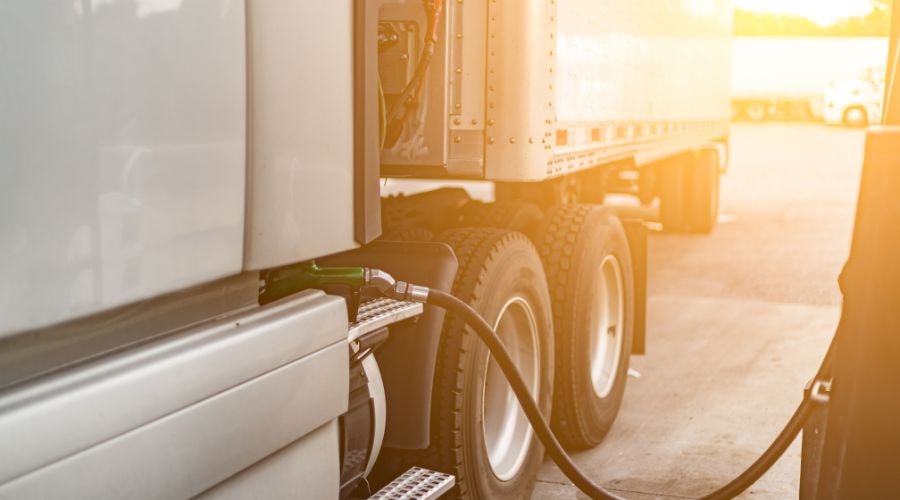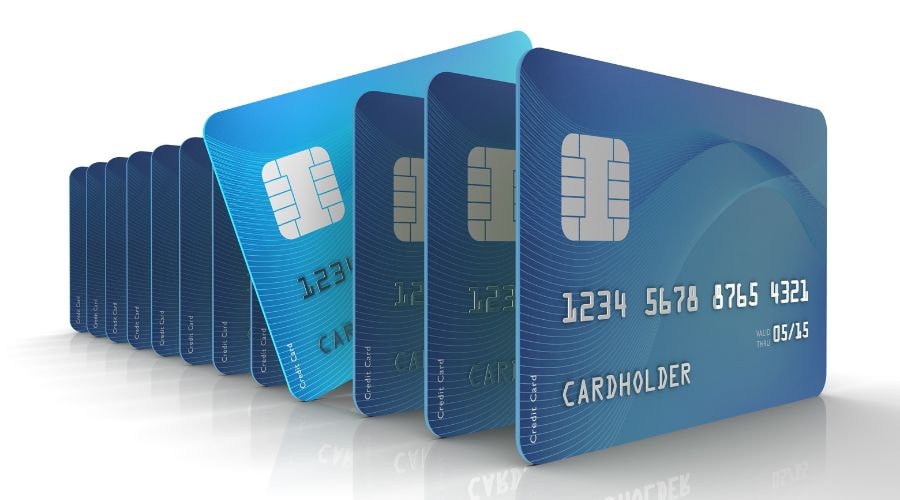
What Is a Fleet Card? Complete Guide to Fleet Fuel Cards for Trucking Companies in 2025
Fleet cards offer trucking companies and fleet operators a powerful solution for managing fuel expenses, reducing fraud, and streamlining operations.
These specialized payment tools go far beyond traditional credit cards, providing comprehensive expense management and security features tailored to the transportation industry.
Key Takeaways
- Fleet cards are specialized payment tools designed for businesses operating multiple vehicles, offering fuel discounts ranging from 3¢ to 30¢ per gallon
- Two main types exist: credit-based fleet cards and cash-secured prepaid options, each serving different business needs and credit profiles to manage fuel costs
- Modern fleet cards provide enhanced security through PIN protection, real-time monitoring, and spending controls that prevent unauthorized usage
- Fleet cards integrate with telematics and fleet management software to automate IFTA reporting and provide comprehensive operational insights
- Universal acceptance networks offer broader coverage, while closed-loop networks typically provide deeper fuel discounts at participating locations
{{CTA}}
What Is a Fleet Card and How Does It Work?

A fleet card is a specialized payment instrument designed to purchase fuel specifically for businesses operating vehicle fleets, providing enhanced expense management capabilities beyond those offered by traditional credit cards or debit cards. Fleet cards operate through partnerships between fuel companies, banks, or third-party fuel card providers, which issue cards linked to centralized business accounts.
The operational process begins when businesses apply for fleet card programs through authorized providers. During setup, companies establish spending limits, purchase restrictions, and assign individual cards to specific drivers or vehicles. When drivers use fleet cards at authorized merchants—primarily gas stations, truck stops, and maintenance facilities—they often must provide additional information such as vehicle identification numbers and odometer readings.
This extra data collection serves dual purposes: enhancing security while generating comprehensive operational analytics. Fleet managers receive consolidated monthly billing statements with itemized transaction details for each card, simplifying accounting procedures while providing granular visibility into spending.
Modern fleet cards offer:
- Real-time transaction monitoring and alerts
- Customizable spending controls by category, time, and amount
- Integration with fleet management software and accounting systems
- Automated expense reporting and tax compliance features
Ready to streamline your fuel management? Get started with AtoB's fleet card solution and start saving on fuel costs today.
What Are the Different Types of Fleet Cards?
Fleet cards fall into several distinct categories, each serving different operational needs and business profiles.
Credit-Based Fleet Cards
Credit-based fleet cards allow companies to make fuel purchases without upfront deposits, operating similarly to traditional business credit cards. These cards offer payment flexibility by deferring fuel costs until the next billing cycle, which helps manage cash flow during periods of variable revenue. Credit approval typically requires business and personal credit evaluations.
Cash-Secured Fleet Cards
Cash-secured or prepaid fleet cards require companies to load specific amounts before usage. These cards eliminate credit requirements and approval delays, making them ideal for newer businesses or those with limited credit history. The prepaid structure provides enhanced budgetary control by limiting spending to preloaded amounts.
Closed-Loop vs. Open-Loop Networks
Closed-loop fleet cards work within specific fuel networks, typically providing deeper discounts (often 20-40¢ per gallon) but limiting where drivers can fuel. These cards are ideal for operations with predictable routes and access to network locations.
Open-loop or universal fleet cards function anywhere standard credit cards are accepted, providing broader operational flexibility. While discounts may be lower (typically 3-15¢ per gallon), the universal acceptance eliminates the need to plan routes around specific fuel networks.
What Are the Main Benefits of Using Fleet Cards?
Fleet cards deliver substantial operational and financial benefits that extend far beyond simple payment processing.
Fuel Cost Savings
The primary benefit comes from fuel discount programs, with savings ranging from 10¢ to 30¢ per gallon depending on provider networks and purchase volumes. A small fleet consuming 6,000 gallons monthly can save $1,800-$21,600 annually with a 30¢ per gallon discount.
Enhanced Security Features
Modern fleet cards provide comprehensive fraud protection through:
- PIN authentication requirements for every transaction
- Real-time transaction monitoring and alert systems
- Geographic restrictions preventing unauthorized usage
- Purchase category controls limiting spending to fuel and approved services
Operational Efficiency Improvements
Fleet cards streamline operations by:
- Eliminating manual expense tracking and receipt management
- Providing automated expense categorization for accounting systems
- Generating detailed reports for tax compliance and budgeting
- Integrating with telematics systems for comprehensive fleet oversight
Cash Flow Management
Fleet cards enhance cash flow by optimizing billing cycles and consolidating expenses. Many providers offer interest-free weekly or biweekly billing that aligns fuel payments with revenue collection cycles.
{{CTA}}
Who Should Use Fleet Cards?
Fleet cards benefit businesses across various transportation sectors, offering different solutions tailored to specific operational profiles.
Trucking Companies
Long-haul trucking companies benefit most from closed-loop networks with extensive truck stop coverage and substantial fuel discounts. These fleets typically achieve the highest return on investment due to large fuel volumes and consistent routing patterns.
Local Delivery Services
Regional and local fleets benefit from universal acceptance fleet cards that provide flexibility for varied routing patterns. These operations often prioritize convenience and broad network coverage over maximum fuel discounts.
Independent Contractors
Owner-operators and independent contractors can access specialized fleet card programs designed to address their unique needs, including simplified credit approval processes and direct billing arrangements that reduce financial risk for contracting companies.
Construction and Service Fleets
These operations benefit from multi-service fleet cards that cover fuel, maintenance, parts, and other vehicle-related expenses through unified payment systems with comprehensive spending controls.
Discover which AtoB fleet card solution works best for your operation and start maximizing your fuel savings.
How Do Fleet Card Transactions Work?

Fleet card transactions follow enhanced security protocols that distinguish them from traditional credit card usage.
Transaction Process
- The driver presents the fleet card at an authorized merchant
- System prompts for PIN authentication and additional data (odometer, vehicle ID)
- Transaction amount and details are verified against spending controls
- Real-time authorization occurs, with potential for immediate decline if limits are exceeded
- Transaction data is captured and transmitted to management systems
Data Collection and Reporting
Each transaction generates comprehensive data, including:
- Fuel quantity and fuel price per gallon
- Transaction location and timestamp
- Vehicle identification and driver information
- Odometer readings for mileage tracking
This data automatically populates expense management systems and regulatory compliance reports, eliminating manual data entry requirements.
What Controls and Security Features Do Fleet Cards Offer?
Modern fleet cards incorporate sophisticated security measures that provide comprehensive protection against fuel theft and unauthorized usage.
Spending Controls
- Transaction limits: Daily, weekly, or per-transaction spending caps
- Category restrictions: Fuel-only or multi-category purchase controls
- Time-based controls: Restrictions on when cards can be used
- Geographic limitations: Preventing usage outside designated areas
Security Technologies
Advanced fleet cards use One-Time PIN (OTP) technology that generates unique codes for each transaction, delivered to authorized users' mobile devices. This system prevents skimming attacks and unauthorized usage even if lost or stolen cards are compromised.
Real-Time Monitoring
Fleet cards provide immediate alerts for:
- Unusual spending patterns or locations
- Transactions exceeding set spending limits
- Multiple rapid-fire transactions indicating potential fraud
- Usage outside normal operational hours or geographic boundaries
How Do Fleet Card Discounts and Savings Work?
Fleet card savings mechanisms vary significantly among providers, requiring careful evaluation to maximize benefits.
Discount Structures
- Fixed per-gallon discounts: Consistent savings across all network purchases
- Volume-based tiers: Increasing discounts based on monthly fuel consumption
- Network-specific pricing: Different discount rates for various merchant categories
- Time-based promotions: Enhanced savings during specific periods or market conditions
Calculating Total Savings
Effective fleet card evaluation requires analyzing the total cost of ownership, including:
- Fuel discount rates and eligible volumes
- Monthly fees and transaction charges
- Network coverage and convenience factors
- Administrative time savings and efficiency improvements
For example, a fleet using 10,000 gallons monthly with a 25¢ per gallon discount saves $2,500 monthly ($30,000 annually), easily justifying modest monthly fees while providing substantial net cost savings.
How Do You Apply for Fleet Cards?
The fleet card application process has streamlined significantly, with most fuel card providers offering digital applications completed in 10-30 minutes.
Required Documentation
- Business registration certificates and tax identification numbers
- Financial statements or bank account verification
- Vehicle registration information and estimated fuel consumption
- Personal identification and guarantee requirements (varies by provider)
Application Process
- Complete online application with business and operational details
- Submit required documentation through digital upload systems
- Undergo credit card evaluation (business and potentially personal credit review)
- Receive approval decision (ranging from instant to several business days)
- Card production and activation (typically 3-10 business days)
Alternative Qualification Methods
Some providers offer cash-secured programs that eliminate credit checks entirely, appealing to newer businesses or those with credit challenges. These programs require prepayment but provide immediate access to fleet card benefits.
What Are the Costs and Fees Associated with Fleet Cards?
Fleet card fee structures vary dramatically among providers, requiring careful analysis to determine total program costs.
Common Fee Types
- Monthly per-card fees: Range from $0 to $12 per card
- Setup/activation fees: $0-$50 depending on provider
- Transaction fees: Typically $3-$5 for out-of-network purchases
- Replacement card fees: $0-$10 for lost or stolen cards
- Administrative fees: Charges for paper statements, research requests, or special reports
Subscription Models
Some providers offer subscription-based pricing that covers an unlimited number of cards within tiered service levels. This model ranges from $39 per month (Basic) to $99 per month (Enterprise), potentially benefiting larger fleets with multiple cards.
Zero-Fee Alternatives
Competitive pressure has led several fuel card providers to eliminate fees. Some offer zero monthly fees, setup charges, and replacement fees, making them attractive for large fleets where per-card fees would accumulate substantially.
What Should You Look for When Choosing a Fleet Card Provider?

Effective fleet card selection requires evaluating multiple factors beyond simple fuel discount rates.
Network Coverage and Acceptance
- Geographic coverage aligning with operational routes
- Merchant quality and truck-friendly locations
- Fuel brand preferences and availability
- Emergency fueling access nationwide
Technology and Integration Capabilities
- Mobile applications for account management and fuel station location
- Integration with existing fleet management software and accounting systems
- Real-time reporting and analytics capabilities
- Telematics system compatibility for automated data sharing
Customer Support and Service Quality
- 24/7 customer service availability for drivers and fleet managers
- Dedicated account management for larger fleets
- Issue resolution responsiveness and efficiency
- Training and onboarding support quality
Experience AtoB's comprehensive fleet card solution with universal acceptance, competitive savings, and industry-leading support.
Fleet Card vs Credit Card: Complete Comparison Table
What Additional Services Do Modern Fleet Card Providers Offer?
Contemporary fleet card providers have evolved into comprehensive fleet management platforms offering integrated services beyond payment processing.
Fleet Management Tools
- Route optimization and fuel stop planning
- Vehicle maintenance scheduling and tracking
- Driver performance monitoring and coaching
- Fuel efficiency analysis and improvement recommendations
Financial Services
- Factoring partnerships for improved cash flow
- Insurance products and risk management solutions
- Equipment financing and leasing programs
- Payroll services for truck drivers and contractors
Technology Solutions
- Mobile applications for drivers and fleet managers
- API integrations with existing business systems
- Telematics platform partnerships
- Electronic logging device (ELD) integration
Common Fleet Card Challenges and How to Avoid Them
While fleet cards offer substantial benefits, implementation challenges can diminish their effectiveness if not addressed through proper planning and management.
Driver Adoption and Compliance Issues
Challenge: Drivers may resist new payment procedures or fail to follow established protocols.
Solution: Provide comprehensive training, clear policies, and ongoing support to ensure proper card usage and data collection compliance.
Network Limitations and Route Planning
Challenge: Closed-loop networks may not align with operational routes, forcing drivers to detour for fuel.
Solution: Evaluate network coverage during the selection process and consider universal cards for fleet operations with diverse routing patterns.
Integration Complexities
Challenge: Connecting fleet cards with existing management systems can prove technically challenging.
Solution: Verify integration capabilities before selection and plan adequate implementation time with technical support.
Cost Management and Fee Accumulation
Challenge: Multiple fees can erode fuel discount benefits if not carefully monitored.
Solution: Calculate the total cost of ownership, including all fees, and regularly review statements to identify unexpected charges.
FAQs
Are fleet cards only for trucking companies?
No, fleet cards benefit any business operating multiple vehicles, including delivery services, construction companies, government fleets, and service businesses. Different card types are optimized for various fleet sizes and operational patterns.
Can independent contractors get fleet cards?
Yes, many fleet card providers offer specialized programs for independent contractors, including direct billing arrangements and simplified credit approval processes. Some programs require no personal guarantees from business owners.
Do fleet cards expire like regular credit cards?
Yes, fleet cards have expiration dates and require periodic renewal. Most providers automatically issue replacement cards before expiration to prevent operational disruptions.
What happens to unused balances on prepaid fleet cards?
Unused balances typically remain available for future fuel purchases unless accounts are closed. Some providers may charge inactivity fees for dormant accounts, so review terms carefully.
Can fleet managers set spending limits by time of day?
Yes, modern fleet cards offer sophisticated time-based controls that restrict usage to specific hours, days of the week, or operational schedules. These controls enhance security and prevent unauthorized after-hours usage.
Do fleet cards work internationally?
International acceptance varies by provider and card network. Some cards are accepted in Canada and Mexico, while others are only valid in U.S. locations. Verify international capabilities if cross-border operations are required.
What's the minimum fleet size to qualify for fleet cards?
Most providers accept single-vehicle operations, although some programs require a minimum fuel volume or multiple vehicles to be used. Requirements vary significantly among providers, with options available for operations of all sizes.
Can you get cash advances with fleet cards?
Cash advance capabilities are limited with most fleet cards, as they're designed primarily for fuel and maintenance purchases. Some providers offer limited cash access for operational emergencies, but fees may apply.
How long does it take for fleet card transactions to be processed?
Fleet card transactions are processed in real-time at the point of sale, with data typically appearing in management systems within minutes. Billing typically occurs on a weekly or monthly cycle, depending on the provider.
Are there fleet cards specifically for electric vehicles?
Yes, specialized EV fleet cards are emerging that provide access to charging networks, simplified reimbursement for diverse charging scenarios, and integration with charging management systems. These cards address unique challenges of electric fleet management.
Final Thoughts
Fleet cards have evolved into essential tools for businesses operating vehicle fleets, providing far more value than simple fuel card payment processing. The combination of significant fuel savings, enhanced security features, comprehensive expense management, and operational efficiency improvements makes fleet cards compelling investments for transportation companies of all sizes.
Success with fleet cards depends on careful selection of providers that align with operational requirements, route patterns, and cost priorities. Whether choosing closed-loop networks for maximum fuel savings or universal cards for operational flexibility, the key lies in understanding the total cost of ownership and long-term strategic benefits.
Start maximizing your fleet's potential with AtoB's advanced fuel card solution and discover how much your operation can save while gaining operational control and security.
{{CTA}}
Citations:
[1] https://sokolis.com/resources/blog/top-6-fleet-card-benefits-for-your-trucking-company/
[2] https://stripe.com/resources/more/what-is-a-fleet-management-card-what-businesses-need-to-know
[3] https://vivacf.net/insights/benefits-fuel-cards-trucking-business/
[4] https://www.geotab.com/blog/fleet-fuel-cards/
[5] https://www.wexcard.com/does-your-business-need-a-fleet-card/
[6] https://cnrgfleet.com/fuel-card-fee-comparison-see-how-much-fleet-fuel-cards-cost/
[7] https://www.pfleet.com/blog/best-fleet-fuel-cards-for-business
[8] https://www.multiservicefuelcard.com/news/is-a-fuel-card-worth-it/
[9] https://www.multiservicefuelcard.com/news/otp-how-one-time-pin-technology-enhances-fuel-card-security/
[10] https://gomotive.com/products/features/ifta-reporting-automation/
Get started with AtoB


.jpg)

